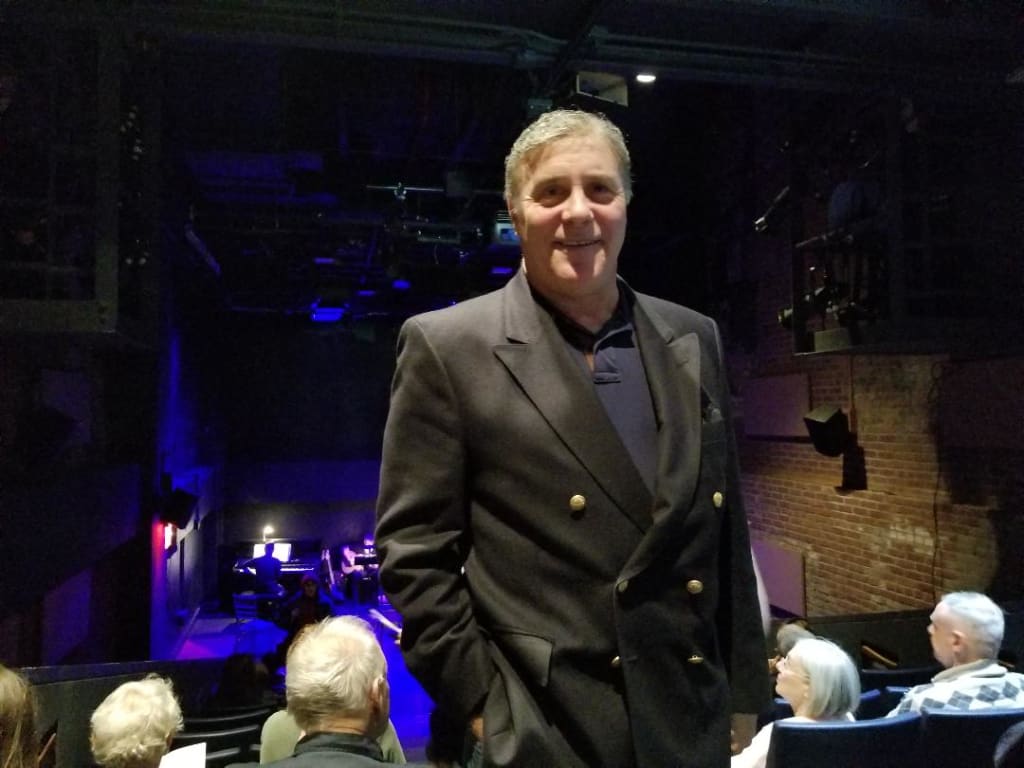'I'm Not a Comedian... I'm Lenny Bruce'
Theater Review

I do not understand the title of the play I'm Not a Comedian... I'm Lenny Bruce at the Cutting Room. The entire 90 minutes, or most of it, dealt, albeit, loosely on his comedic life. Lenny Bruce (Ronnie Marmo), spoke about his showbiz mom—formerly from Brooklyn, but now residing in Long Island. The show opens up with Bruce M. Cing at a young age. He immediately goes to 1947 where he took the stage as Lenny Marcelle. Marmo has a whiney Long Island accent (a cross between Tony Curtis and Andrew Dice Clay). Bruce does the Jewish schtick with his mom. He spoke about his shock value and how he was gaining popularity by it. In real life, Bruce made a killing in the Borscht Belt (for some reason that fact was not written into the play).
Under a nice stage as a set, the lighting by Matt Richter was incredible. Under brilliant pinks, purples, cool blues, and reds, the stage is electric for Marmo. More like a jazzy feel, Marmo is able to do comedic routines and at times banter with the audience. At times, we feel the resonance of this before his time as a comedian.
My problem with I'm Lenny Bruce is that it never goes beyond the surface. He talks about his life and we see him as a problematic person, even as a child. We see some of his fears when his father and mother divorced when he was eight years old. However, we never truly see the real Lenny Bruce; the audience member walks out of this 90-minute show not knowing very much about who he really was.
The play focuses on much of his court battles over obscenity charges. Bruce was tried in Chicago and New York, among other places around the country. In Chicago and New York we see his impassioned pleas that under the First Amendment he has the right to say anything he wants to on stage. At this point, Bruce is spiraling out of control. He's doing heavy drugs and getting banned from clubs. This lifestyle hurts Bruce as a comedian as well as his wallet.
We meet Honey Harlow, a stripper who Bruce marries. Both Harlow and Bruce are promiscuous. They attend orgies, do drugs, and live life on the edge. They have a child, Kitty, and as she grows up, she sees her parents divorce. She sees her father in bad shape, who got custody of his child, but that was a big consolation prize. The two parents were both messed up from drugs and alcohol, as well as the social scene that hurt the two worse in their standing in society. Other parents won't even let their kids play with Kitty.
Bruce touches on the subject of his car accident, how he was a bad person, but never changed his ways. Rather than change his life, Bruce plowed through his act and drugs with reckless abandonment. He cared less about what people really thought. He cared less about his family and kept plodding forward, regardless of starting to be blackballed by clubs.
With no money, no friends, no wife, and a child living at his grandmother, he turns harder to drugs. He ended up dying on a floor, alone in the world. What caused this? How did Bruce turn out like this? The play never really tells us. The show only scratches his life; it just never goes deep enough. His spiraling out of control is not evident of "why" in the play. We do see some, but not nearly enough.
Joe Mantegna directed this show. He did a great job moving Marmo around and about the stage. We did feel Bruce's pain at times, and we felt sorry for him at other times. The problem with the play is that it was not written deep enough for us to fully grasp what Lenny Bruce was all about and why he was the way he was. A good example of this was when Bruce was eight years old he wanted water and a hug from his mother. We never fully know why. Was he scared? No. Nothing.
Bruce mentions that Governor George Pataki pardoned him for his past crimes. At the end of the show, we hear present comedians talking raunchy, as did Bruce years earlier. The show gave us the thought that Bruce was the leader and somebody at the forefront of shock comedy. Many have followed Lenny Bruce's comedy. He was the very first to do shock comedy. He paid dearly for it, but he cared less. Even if it meant losing everything.
What could have been a popular show with all of the many comedy clubs in the city, this play simply doesn't provoke us enough.
About the Creator
Robert M Massimi. ( Broadway Bob).
I have been writing on theater since 1982. A graduate from Manhattan College B.S. A member of Alpha Sigma Lambda, which recognizes excellence in both English and Science. I have produced 14 shows on and off Broadway. I've seen over700 shows






Comments
There are no comments for this story
Be the first to respond and start the conversation.